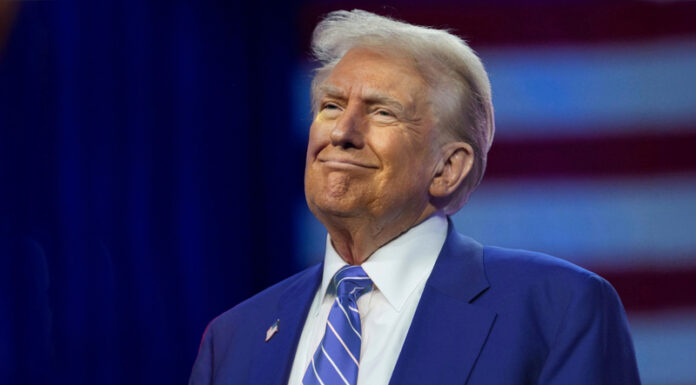President Donald Trump made clear today that he will not back down from his aggressive tariff strategy, threatening to veto bipartisan legislation aimed at limiting his authority to impose tariffs without congressional approval. The move comes as markets experienced significant volatility following recent tariff announcements.
In a statement released April 9, the White House warned that if Congress passed the Trade Review Act of 2025—a bill submitted by Sens. Maria Cantwell (D-Wash.) and Chuck Grassley (R-Iowa)—Trump “would veto the bill.”
The White House stated that the Trump Administration is implementing policies to prioritize America in trade by expanding market opportunities for U.S. farmers, increasing wages for American workers, promoting fair and reciprocal trade, and bringing back essential manufacturing to strengthen national security. It emphasized that tariffs play a key role in this strategy and warned that the proposed legislation would undermine the president’s authority and responsibility to shape foreign policy and safeguard national security.
The bipartisan legislation would significantly curtail presidential powers to impose tariffs without congressional oversight. The bill requires the president to notify Congress within 48 hours of implementing a tariff, provide justification for the necessity of the measure, and submit an economic impact analysis. Congress would then have 60 days to approve the tariff to make it permanent, with the option to repeal it through a resolution of disapproval.
Support for the Trade Review Act spans both parties, with backing from Democratic lawmakers and Republican Sens. Grassley, Jerry Moran (R-Kans.), Lisa Murkowski (R-Alaska), Mitch McConnell (R-Ky.), Thom Tillis (R-N.C.), Todd Young (R-Ind.), and Susan Collins (R-Maine).
Sen. Rand Paul (R-Ky.) has proposed his own version of tariff control legislation, which would prevent any tariff from taking effect until approved by a joint resolution in Congress.
The legislative pushback comes amid dramatic developments in Trump’s trade policy. On April 9, the stock market experienced one of its largest rallies since World War II after the president announced a 90-day pause on higher tariffs for most countries, while simultaneously raising duties on Chinese imports to 125%.
The S&P 500 jumped 9.5% following the announcement, though it remains below levels seen before Trump’s initial broad tariff plans were revealed last week. The Dow Jones Industrial Average climbed nearly 3,000 points, while the Nasdaq composite rose 12.2%.
Treasury Secretary Scott Bessent confirmed that President Trump would maintain a 10% baseline tariff on nearly all global imports while suspending his proposed “reciprocal” tariffs that had targeted major trading partners with rates of 20% for the European Union, 24% for Japanese imports, and 25% for goods from South Korea.
China, however, faces significantly steeper penalties. Trump’s decision to increase tariffs on Chinese imports to 125% has intensified concerns about potential market instability and economic disruption between the world’s two largest economies. China has already responded with retaliatory measures, imposing an 84% tariff on goods imported from the United States, up from a previous rate of 34%.
The administration has framed its tariff strategy as essential for national security and economic prosperity. In a presidential proclamation, Trump declared a national emergency to address “large and persistent annual U.S. goods trade deficits,” arguing that these imbalances have weakened the country’s manufacturing base and critical supply chains.
The administration maintains that tariffs can effectively reduce threats to U.S. national security while achieving economic objectives with minimal impact on consumer prices. Critics, however, contend that the measures amount to a substantial tax increase on American families.
Rep. Josh Gottheimer, a co-sponsor of the House version of the Trade Review Act, argued that presidential tariff actions have effectively created “a $3,800-a-year tax increase” for American households.
Meanwhile, House Republicans have taken steps to shield Trump’s tariff policies from congressional intervention. The House Rules Committee recently approved a measure that would prevent the chamber from voting on legislation to overturn Trump’s national emergency declaration justifying the tariffs, effectively stalling Democratic efforts to force a vote on a resolution of disapproval.
Despite the temporary pause on most targeted tariffs, uncertainty remains regarding the administration’s long-term trade strategy. The White House has not specified which countries will benefit from the 90-day tariff pause, nor clarified whether the 10% baseline tariffs will remain permanently.
Treasury Secretary Bessent has indicated that the administration will now face the challenge of negotiating dozens of potentially complex trade deals within the three-month window. Some analysts view the pause as primarily a negotiating tactic designed to bring countries to the bargaining table.
If either version of the congressional tariff oversight legislation were to pass both chambers, it would require a two-thirds majority vote in both the House and Senate to override the president’s promised veto—a threshold that appears difficult to achieve given current congressional dynamics.








